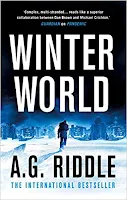“Winter World” by A.G. Riddle – Ice Age from the Void
A.G. Riddle is a true literary explorer seeking to push humanity to its limits and beyond, setting them on a desperate collision course with something beyond its understanding in Winter World .
With a sudden ice age dawning on humanity entire swathes of land become uninhabitable and people begin dropping like flies, with anarchy reigning supreme.
Looking to the stars for a miraculous solution, the remnants of humanity find a massive mysterious object floating near Mars...whatever it is, our civilization's hopes of survival rest entirely in its hands.
A.G. Riddle Pushes Humanity to the Brink
Daily life might fail to remind us of it, but Earth's existence, and consequently humanity's, is far from being assured from one century to the next. There are no shortage of potential cataclysms and catastrophes waiting to befall our beloved home planet, whether they be natural, man-made, or even of a cosmic nature.
Speaking in realistic terms, our climate is probably the closest thing we have presenting a risk to our long-term survival, with global warming being very much a current and increasingly unavoidable topic for our civilization as a whole.
Though going up in flames is a real threat, A.G. Riddle reminds us in Winter World there are other ways our climate might decide to destroy us, namely a new ice age.
When the novel begins things have already mostly gone South for the planet, with a sudden ice age gripping the globe and quickly rendering countless zones uninhabitable. Those who do not fall victim to the lethal and unexpected climate change embark on harsh journeys of war and survival for the last safe havens in a world upturned into anarchy.
Nobody is capable of explaining this strange phenomenon, and in a last-ditch effort scientists send out probes into the cosmos to collect readings from the solar system... and they make the startling discovery of a mysterious object drifting towards the sun.
None can identify what the object is or how it might be connected with Earth's predicament, if at all, but everyone agrees on one thing: looking into it is the best chance they have at surviving. They hastily launch a first contact mission, with one of the members being Dr. James Sinclair, one of the world's foremost scientific minds, wrongfully imprisoned for his historically-significant inventions.
His expertise is not only vital for the success of the mission, but also to the rescue of ISS commander Dr. Emma Matthews who has been struck with a tragedy of her own; while she still doesn't know it, Emma is destined to be a key player in humanity's potential salvation. With Earth's final days on the horizon, the past, present and future of an entire civilization rest in the hands of a few people.
Excursion into the Frozen Wastes
We've already seen many depictions of an apocalyptic Earth in modern literature, with the genre having recently taken off like never before for whatever reason.
At this stage, we have already developed the concept of cookie-cutter and cliches in this domain, to the point where authors need to start going the extra mile to elevate themselves above their peers. In my opinion, the first step in determining this is the care and precision with which the author describes the ruined world.
In this case, my hat goes off to Riddle for depicting one of the more harrowing and soul-sucking images of an environmental apocalypse I can recall in recent memory.
I would say somewhere around a third of the book is spent in the frozen wasteland and it's more than enough time for us to become intimately acquainted with it.
The landscapes are depicted in staggering detail and draw out feelings of helplessness and despair, successfully driving home the point of the Earth becoming a nearly alien and inhospitable planet for us.
Going a step further above it, Riddle also delves into the societal consequences of the cataclysm, and I would venture to say there are some relatively heavy moments where we become privy to the rotten fruits total anarchy tends to bear.
What the author does truly masterfully when the depicting the radically different social dynamics of the destroyed world, in my opinion, is he always stays within the confines of the believable. While he does let his imagination run loose here and there, the image he paints of the world always feels like it remains accurate enough to become reality one day.
Ultimately, the struggles of the people are never lost on us, and the overall gravity of the situation creates some very real stakes which give the story a true kind of tension you won't find just anywhere these days.
The Hopeful Journey Beyond
As mentioned before, while about a third of the book might be spent on the frozen home planet, the rest of it mostly takes place in space as we follow our crew on their journey of making contact with the mysterious object.
With what has already been established on Earth, the importance of their mission never goes out of focus as we are given consistent reminders of what will likely happen should they fail.
The various possibilities as to what might happen once they reach their destination are certainly intriguing and the mystery aspect of it is nicely drummed up wherever necessary.
As for the actual crew themselves, I found them to be quite well-written without actually going into too much depth about their characters. We learn more than enough about them to have complete pictures (more or less) of who they are, what they are capable of and why they are doing this; we certainly don't need to dive into their troubled childhoods to know these things, and the author understands not to burden us with them.
As a result, we are left with a crew of intelligent, selfless and brave people we can rather easily get behind, the kind we would actually expect to be gathered for a mission of this sort. While there is a good amount of technological jargon thrown around between the characters (I'm not even entirely sure how much of it is real), it was all within the limits of what a layman such as myself was capable of imagining.
Now, even though this is the first out of two books, I was pleasantly surprised with how the story wrapped up, to the point where I can say this novel could actually work as a standalone.
Where most authors would have left us on a ginormous cliffhanger to be potentially resolved months down the line, Riddle gives us a conclusion both satisfying and open for continuation. As a stern opponent of unnecessary cliffhangers, I felt this was important to mention.
The Final Verdict
Winter World by A.G. Riddle is one of the more enjoyable and all-around impeccable apocalyptic novels I have had the pleasure of reading recently. Everything is captivating from the planet's predicament to the intrepid adventurers venturing into the unknown in a desperate attempt to save it.
If you enjoy science-fiction stories with technical space exploration set to a background of Earthly desolation, then I highly recommend you give this excellent book a read.
 | A. G. RiddlePersonal site A. G. Riddle is an American author from North Carolina who spent ten years dabbling in the world of internet business before devoting himself to his true passion, fiction writing. The Atlantis Gene is his widely-acclaimed debut novel, having already been translated into over 22 languages and marking the beginning of a bestselling series. |








Comments
Post a Comment